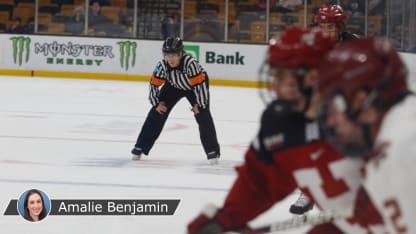Guay becomes first woman to referee in men's Beanpot Tournament
Impressive skating, calm demeanor help pioneer focus on game, not history

Katie Guay was simply announced at 5:02 p.m. on Monday as she stood in a row with the game's other officials, second from the left at center ice. And yet, there was everything special about the moment, even though Guay was as likely as anyone to undersell its significance.
Still, she admitted, "It was everything I thought it was going to be."
Because Guay, as the puck dropped minutes later, became the first female official to work the men's Beanpot, the venerable Boston hockey tournament that pits Boston College, Boston University, Harvard, and Northeastern together on consecutive Monday nights in early February to crown the city's best.
She was on the ice for the first game, in which BC defeated Harvard 2-1 to earn a spot in the championship game next Monday, as a referee, showing off her calm demeanor and impressive skating skills and her ability to blend in.
After the game, the 36-year-old wasn't talking about history or barriers broken or steps taken. Guay was focused on the next day when she would again take the ice, this time for the women's Beanpot. The venue would be different - - Harvard's Bright-Landry Hockey Center vs. TD Garden - - but the game would be the same. She would be the same.
Guay had felt the differences, of course, walking in the door to TD Garden. She had known what it meant stepping on the ice. But, as she said, "Once that first puck got down it was just another hockey game. Everything else, you just put it aside and just focus on the game."
That's part of the way she has gotten herself here.
"As far as her working the Beanpot, that's an assignment that she's earned, regardless of her chromosomes," said Paul Stewart, director of officiating for ECAC hockey and a former NHL official who was inducted into the U.S. Hockey Hall of Fame in 2018.
"If it's a long-reaching effect, then I'm glad for that because I hope that a lot of people see her out there and say, you know, my daughter plays hockey, maybe she can referee when she's finished playing."
Because that was how Guay got here.
She started not long after her college career, where she was a forward for Brown University from 2001 to 2005. Working for BJ's Wholesale Club as an auditor out of school, she found herself traveling the East Coast without the opportunity to spend the time in rinks that she had been used to her whole life, starting when she was dragged to hockey practice alongside her older brother and sister.
"I just really missed it, being in the rink for so many years," Guay said. "It was a place that I love being and having that void certainly reiterated how much I loved being in the rink."
She managed to find time to play recreational women's hockey on Sundays, but gas prices had just spiked and Guay figured that maybe she could earn a few extra bucks officiating the games before hers to offset her trips to the rink. She had loans to pay off, and the boost would help.
She did not anticipate that decision leading to the Olympic Games.
Guay found herself in South Korea last year, officiating women's hockey at the 2018 PyeongChang Olympics after a career as an official that had already seen her become the first woman to work men's Division 1 college hockey, International Ice Hockey Federation tournaments, all while working a full-time job, now with The USA Hockey Foundation as its director of philanthropy.
The biggest reason why Guay has been called upon to officiate games on that level is her skating, which has impressed Stewart as long as he's known her.
"Her skating ability is easily one of the best in the officiating ranks that I've ever seen, both in the [NHL] and at other levels," he said. "Her natural skill with coordinating her lower half of her body and her upper half, everything is in sync and it's just so effortless. She uses that to her advantage because she gets better sightlines with less effort.
"She has the best backward skating ability that I've ever seen, bar none. And that's even with players. She skates backward so easily. She's in the top three speed-wise of both men and women's officials that work for me."
It was something that Julie Piacentini could also see immediately.
"Just right away I could tell the potential," said Piacentini, who officiated women's NCAA hockey, becoming the first woman to work a women's NCAA tournament final game, also officiating women's hockey in the 2002 Salt Lake City Olympics and 2006 Turin Olympics as a linesman.
"She was just so smart out there, such a great skater. Just could anticipate the play and she was such a great learner. One of her biggest assets, besides her skating, is just her demeanor. She's so calm and confident, and in officiating, you have to be confident. She just portrayed that right away."
It all adds up to an official that, Piacentini said, sometimes makes it look too easy.
In all that, Guay was able to build up the rapport with coaches that enables an official to move up the ranks, the credibility that fosters increasingly important posts. It's why, as Stewart pointed out, he rarely hears a complaint about her work on the ice.
All those factors led to this moment -- Guay on the ice at the Beanpot on Monday, the first woman in that position. But given that it took until the 67th edition of the men's Beanpot for a woman to get an officiating spot, that brings up this question: When will the NHL do the same?
The NBA and NFL have broken the barrier. The NBA has had female officials for 21 years, with Violet Palmer and Dee Kanter becoming the first women to officiate in a major U.S. professional league. The NFL followed with Sarah Thomas in 2015.
Four women took part at the NHL's officiating combine this past summer and Stephen Walkom, NHL director of officiating, said he believes one day it could happen in hockey.
"It's definitely a possibility," he said earlier this season in an email.
And though Guay said her goal at the moment is to replicate Piacentini's achievement of officiating an NCAA women's Division 1 final game, there are some that believe that she could be the one.
"I'm trying not to make too much of this, but it does have a significance," Stewart said of the Beanpot.
"And I've told Walkom this, that if I had to pick from all the women that I've seen, at every level, that could break the glass ceiling in the NHL, she could.
"I'll tell you why: She's smart. She's athletic. She can skate and communicate. And she grasps things quickly, and I think her confidence is growing."
Not that Guay is convinced of this.
"I do think in my lifetime it will happen," she said. "I'm not sure when, obviously. But I really hope that it becomes a topic of conversation at the lower levels, at the junior hockey level, at the youth hockey level, as there aren't that many women out there officiating women's hockey, so obviously the numbers are up against us at this point."
The hope is that the opportunities are there for women at the lower levels, so they can work their way up, so they can work high-level boys' and, eventually, men's hockey. There needs to be skill development, and there needs to be volume, and there needs to be people willing to give female officials a shot.
"There's a lot of females that came before me that certainly had the skill to get out there, it's just they didn't get the chance," Guay said. "So I feel like I'm doing it for all of them that didn't have the opportunity, and hoping to pave some more paths for the younger officials coming up the ranks."
It was, as Piacentini said, not a small moment. For Guay and for other female officials, ones already in the ranks and ones hoping to find their way there.
"Because," Piacentini said, "this is history."

















